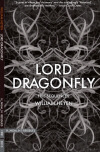Lord Dragonfly
William Heyen’s Lord Dragonfly was first published in 1981 by Vanguard Press, but most of the copies of its paperback edition disappeared shortly after Vanguard sold to Random House. Although three of the books’ sequences have since been republished elsewhere, now all five are together in a 2010 edition by H_NGM_N BKS. The re-issue contains minor editing by Heyen, plus a glowing appreciation by Nate Pritts—the chief editor of the press and Heyen’s former student. There’s also an essay by Matthew Henricksen which maintains that Heyen’s “personal vocabulary of deep imagery becoming peak language…seems to have predicted the direction many young poets are taking today.”
Lord Dragonfly is both a strong book of poetry and a demonstration of Transcendentalist philosophy. In the first sequence, “The Ash,” the narrator deals with the oncoming death of a friend by meditating on a tree. “Of Palestine” uses the vegetation of that country to address the general sorrow of its people. “Evening Dawning” is on growing old. The title sequence “Lord Dragonfly” has the feel of Chinese poetry, as it’s made of Koan-like stanzas such as “In the mowed field / a million crickets for hire. / My steps are money.” The stand-alone poems of “XVII Machines” are especially noteworthy for their metallic beauty and humorous titles like “The Machine that Mends Birds’ Nests” and “The Machine as Jewish Mother.” In one, “The Machine that Kisses You Goodnight”:
stands by your bed, a tree
of lights glowing soft as orchids
in the dark. It purrs and whispers
sleep, my pretty one, sleep.
Taken with the other poems in the sequence, it’s a chilling fable of how machines bring us closer both to the natural world and other humans. Perhaps Heyen’s book has more to say to us now than when it was released twenty years ago.





